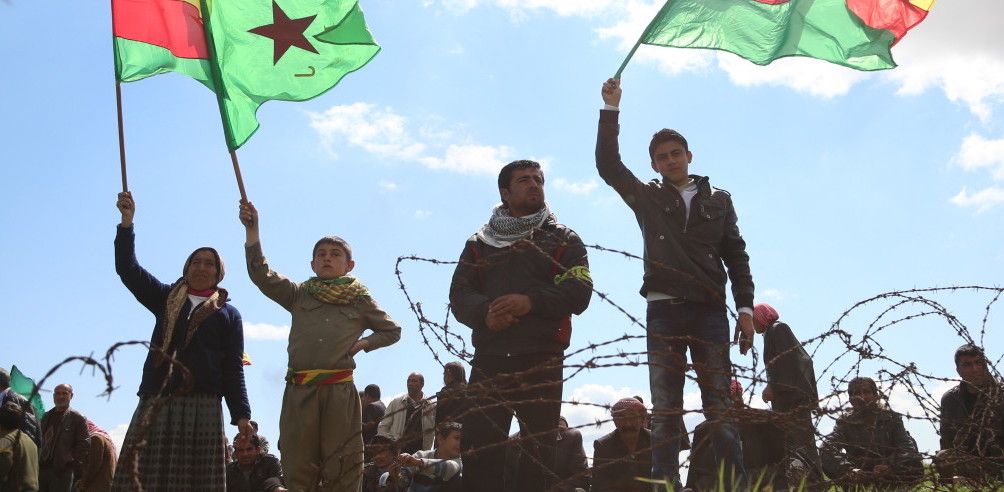A FEDERAL SYRIA
Kurdish Initiatives on the Rise

by Rene Wadlow, Toward Freedom
On March 17, 2016, the "federal democratic system of Rojava" (a Kurdish term for northern Syria) was proclaimed officially. Some 150 representatives of Kurdish, Arab, and Assyrian (largely Christian) groups met in the city of Rmellane in northeast Syria and voted in favor of the union of three "cantons" largely populated by Kurds—the cantons of Afrin, Kobani, and Jezireh.
The government as well as a major opposition coalition present in the Syria negotiations which have been going on in Geneva since the middle of March, the Syrian National Coalition, both stated their refusal of a federalist system which they saw as a first step to the breakup of Syria. The Syrian Foreign Ministry said that "Any such announcement has no legal value and will not have any legal, political, social or economic impact as long as it does not reflect the will of the entire Syrian people." There was no indication of how the "will of the entire Syrian people" was to be determined in the war-torn land.
While the Kurdish issues in Turkey have attracted international attention, and the largely autonomous Kurdish region of Iraq is a major player in Iraqi politics, the Kurds in Syria have been less discussed.
The Kurds of Syria have not been as visible a factor until now as other ethnic or sectarian groups. As Michael Gunter, a specialist on the Kurdish world, writes:
On July 19, 2012, the previously almost unheard Syrian Kurds suddenly emerged as a potential game changer in the Syrian civil war and what its aftermath might hold for the future in the Middle East when in an attempt to consolidate their increasingly desperate position, government troops were abruptly pulled out of the major Kurdish areas. The Kurds in Syria had suddenly become autonomous, a situation that also gravely affected neighboring Turkey and the virtually independent Kurdistan Regional Government in Iraq. Indeed, the precipitous rise of the Kurds in Syria [could] become a tipping point that might help change the artificial borders of the Middle East established after the First World War following the notorious Sykes-Picot Agreement.
In a hope of keeping the Kurds out of the growing armed conflict, shortly after the March 2011 start of the Syrian armed conflict, in April of that year Bashaar al-Assad had granted Syrian citizenship to some 220,000 Kurds that had been long waiting to be considered as citizens or who had been stripped of their citizenship in a 1962 census.
However, armed conflict spread, and the Islamic State started to control territory near Kurdish majority areas. Some observers see the Kurds as "objective allies" of Bashaar as they have many of the same enemies.
Working with the regime has largely saved the Kurdish areas from government bombardment and allowed Kurdish leadership to build alternative forms of government. Gunter discusses in some detail the influence among some Kurdish leaders in Turkey and Syria of the writings of Murray Bookchin (1921-2006) and his views of ecologically-sound autonomous governance—"democratic autonomy."
During the current "fog of war" it is difficult to see what forms of cooperation will be developed among the Kurdish areas of Syria, Iraq, Turkey and possibly Iran. There have been recent talks in Switzerland among Kurdish leaders of the four countries. There are those who see all proposals for federal-confederal forms of government in a previously highly centralized state as a step toward the breakup of the state.
However, in the first years of the French mandate of Syria after the First World War, the French had created a form of "federal" administration, although the French had facilitated the creation of Lebanon which until then had been part of "Greater Syria." It is difficult to envisage a centralized one-party state such as that under the leadership of the al-Assad—father and son—being recreated when the armed conflict stops. Although the Kurds are not present in the UN-Geneva negotiations (at the insistence of Turkey), the federal proposal is now "on the table," and merits being watched closely.
———
Rene Wadlow is resident and a representative to the United Nations for the Association of World Citizens.
This article first ran March 31 in Toward Freedom.
Photo: Rojava Solidarity NYC
From our Daily Report:
Syria: Kurdish-FSA conflict cleaves resistance
World War 4 Report , May 2, 2016
Revolution in Syria and Turkey: mutual betrayal?
World War 4 Report, April 20, 2016
Syrian Kurds declare autonomy —at what price?
World War 4 Report, March 19, 2016
See also:
SYRIA'S INDEPENDENT MEDIA
A Bold Challenge to Extremism
by Julia Taleb, Waging Nonviolence
World War 4 Report, May 2016
SYRIA: REVOLUTION AND INTERVENTION
An Interview with Joseph Daher
(On criticisms of Kuridish autonomy from within revolutionary forces)
by Frieda Afary, Radio Zamaneh
World War 4 Report, February 2016
EPISTEMOLOGIES OF FREEDOM
Interview with a Young Kurdish Revolutionary
by Eleanor Finley, Institute for Social Ecology
World War 4 Report, October 2015
SYRIA'S KURDISH REVOLUTION
The Anarchist Element and the Challenge of Solidarity
by Bill Weinberg, Fifth Estate
World War 4 Report, February 2015
EASTERN ANATOLIA: IRAQ'S NEXT DOMINO
'Greater Kurdistan' Ambitions Could Spark Regional War
by Sarkis Pogossian, World War 4 Report
World War 4 Report, November 2005
—————————-
Reprinted by World War 4 Report, May 13, 2016

















Recent Updates
4 hours 12 min ago
4 hours 21 min ago
4 hours 33 min ago
3 days 7 hours ago
1 week 1 day ago
1 week 1 day ago
1 week 2 days ago
1 week 2 days ago
1 week 3 days ago
1 week 3 days ago